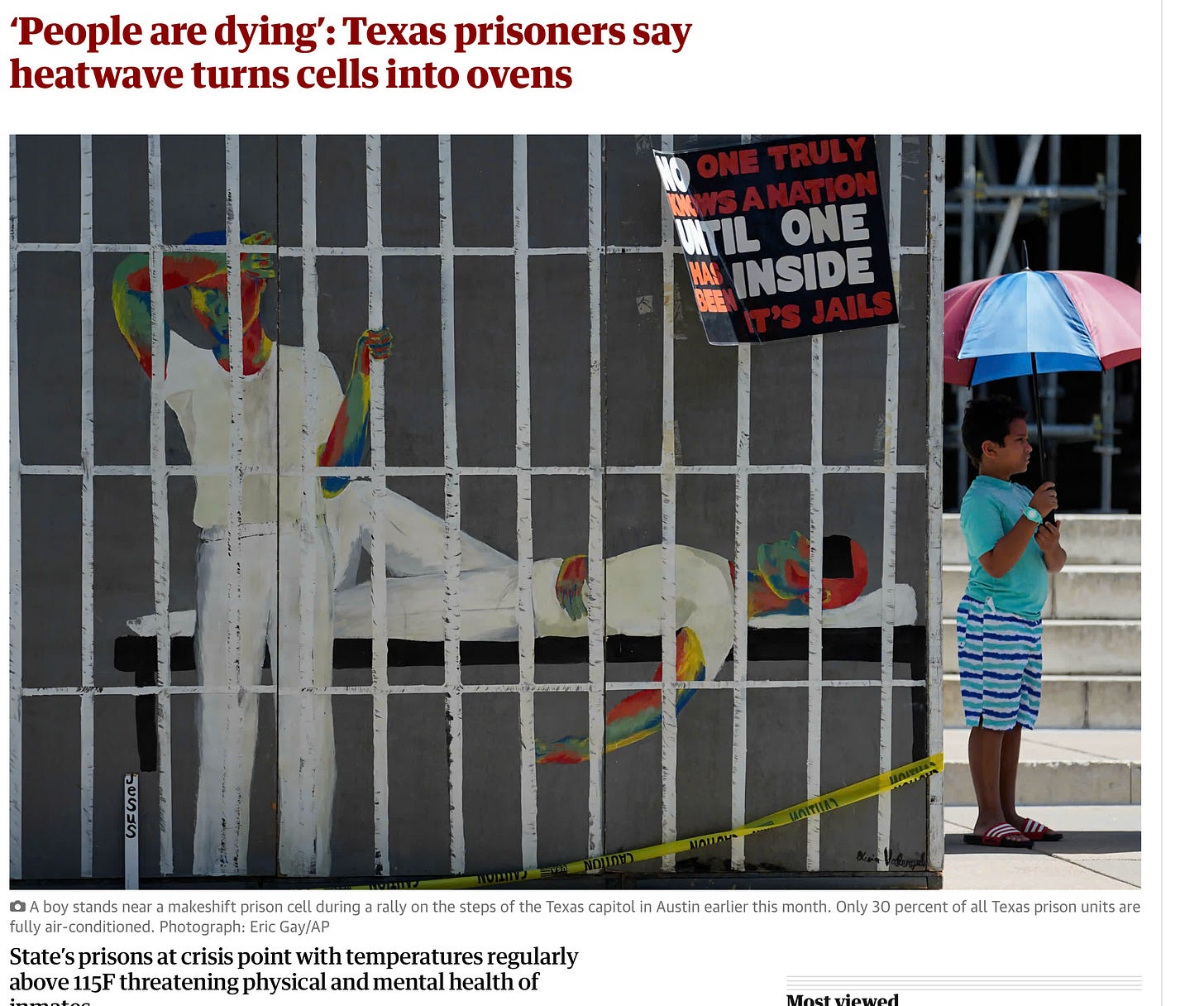Are Prisons Obsolete?
Mass Incarceration in the US has failed. Should jails be reformed or abolished?

The United States has more prisoners than any other country in the world. There are more people in American prisons today than there were in Stalinist Gulags (Gopnik, 2024). On a per capita basis, the US is ranked 6th, only behind American Samoa, Turkmenistan, Rwanda, Cuba, and El Salvador. It is claimed that some fourteen prisoners die of extreme heat annually in Texas (Pilkington, 2024). The United States has “incarceration on a scale that, despite recent efforts at reform, boggles the mind and shivers the heart” (Gopnik, 2024). No other country engages in mass incarceration to this scale. Prisoners suffer humiliation and brutal treatment and engage in criminal acts once they are released. American prisons appear to be failing. In that case, isn’t it fair to ask whether we still need them?
Last month, an article in The New Yorker by Adam Gopnik invited readers to reimagine prisons and even consider whether the United States should abolish them entirely. Gopnik opened with “every age treats its penal system as natural, inevitable, and regrettable” and followed by discussing public executions as a means of crime prevention and punishment. Historically, he pointed out, even progressive and humane individuals defended public executions because spectating executions allegedly deterred spectators from engaging in criminal activities. According to this view, without spectators, executions had no purpose. Current systems are fraught with similar assumptions about their purpose, utility, and function. Do these need to be re-examined?

Gopnik summarized the work of different thinkers who have tackled the matter of abolishing or reforming the American Penal system, such as Angela Y Davis, Danielle Sered, and others. He argued that prisons do maintain racial hierarchies given that, for example, in New York, about 15 % of the population is made up of Black people. Still, they make up about 50% of the prison population. In the following table, we summarize Gopnik's portrayal of these ideas.
We have found that these are some of the core issues to consider in the discussion of abolishing and reforming the American carceral system.
Mass incarceration is an American Problem.
The problem of mass incarceration appears to be unique to the United States. Gopnik pointed out that other capitalist countries do not have the same issue. Other Western, industrialized, and free-market countries have managed to build systems with much lower recidivism rates. We have previously written about recidivism and found that American prisoners are three times more likely to be re-arrested than prisoners in Norway.
Resistance to reform
As Gopnik points out, the US public is quite sensitive to violence. He said that as the perception of violence increases, as happened with the rise in homicides during 2020, public opinion becomes less likely to embrace reform. Gopnik explains that “anxiety over social disorder is a fact of democratic life that cannot be wished away, and it tends to erode the kind of political power that remains the one means toward reform” (Gopnik, 2024).
Some people may need to be isolated from society.
While there is no doubt that the carceral system is flawed, there could still be a need for isolating dangerous individuals from society. “Prisons need to be humanized, but that does not mean there are no humans in need of imprisonment” (Gopnik, 2024). He cited the example of a British serial killer in Singapore condemned to be hanged, who would befriend tourists to later beat them to death, dismember them, and rob them of their possessions. Even the killer himself believed he ought to be hanged.
On the other hand, “evil exists, but those who perform evil acts need not be themselves wholly evil and incapable of rehabilitation” (Gopnik, 2024). Gopnik used the example of Adam Roberts, a former drug addict and murderer of his parents who was sentenced to life and can now be followed on Instagram and works as an artist and dog trainer, documenting his life in prison. Thus arguing for the rehabilitation of “evil” individuals.
Treating prisoners as patients
Dealing with prisoners as patients is a way of “diminishing [ing] their humanity” and “their claim to moral agency” (Gopnik, 2024).
We have argued several times that crime is treated as a disease.
Abolishing prisons may prove too radical and unwise to implement. In that same line of thought, Gopnik concluded that while institutions that impose public order, such as prisons, can devolve into class policing, they are also necessary to conduct a relatively peaceful life in society. He finished by advocating for a thoughtful and comprehensive social reform that allows prisoners to be rehabilitated and reinserted into society: "If we are to plant human beings in places where they might blossom again, we need to build better gardens.” (Gopnik, 2024)
What do you think? Should the United States abolish prisons? If not, how should American prisons be reformed?







This is all complex stuff! I suspect hat one of the prime purposes of prisons in the western world is meant to be general deterrence - that is, stopping *other people* from committing crime. It certainly seems to make sense, rooted as the view is in Enlightenment concept if rational choice & free will. The difficulty comes in when we add positivist views of the *causes* of things - including human behaviour. If we believe (as psychologists like me can barely choose not to) that human behaviour has caused, it is difficult if not impossible to believe that we can freely choose it. A stone, after all, has no choice about falling when you let it go. It’s behaviour is caused by scientifically identifiable phenomena. If crime has caused, deterrence shouldn’t work.
Excellent information. Thank you. 😊
This is an interesting topic, and I'm surprised more people are not talking about it.